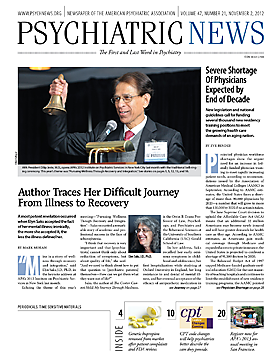Should limits be placed on the discretion of federal district courts to determine when it is appropriate to suspend legal proceedings?
This is the question at the center of a pair of cases heard before the U.S. Supreme Court on October 9 involving the postconviction appeals from two death-row inmates whose mental competence has been called into question.
In July, APA asserted in an amicus brief prepared with the American Academy of Psychiatry and the Law (AAPL) that the court-ordered delay of such cases is appropriate when the appellant’s inability to understand or communicate pertinent information to his or her legal counsel prevents the resolution of claims regarding the conviction’s validity.
“Expecting death-row prisoners with serious mental disorders to be able to work effectively with counsel to challenge their convictions is utterly unrealistic,” Paul Appelbaum, M.D., told Psychiatric News. Appelbaum is the Dollard Professor of Psychiatry, Medicine, and Law at Columbia University; chair of APA’s Committee on Judicial Action; and a past APA president. “As a matter of fairness, courts should stay legal proceedings until prisoners are capable of participating in them meaningfully.”
APA’s stance on this issue was initially formulated as part of its 2005 Position Statement on Mentally Ill Prisoners on Death Row, which is attached to the Supreme Court brief as an addendum. The position statement was based on the work of the American Bar Association’s Task Force on Mental Disability and the Death Penalty, which included APA members.
APA and AAPL also noted in their brief that while the decision of whether to delay a particular postconviction appeal is ultimately a judicial one, medical professionals can provide assistance to help inform the courts’ decisions in these cases.
Specifically, the brief outlined how forensic psychiatrists are equipped to assess an individual’s ability to participate effectively in the legal process, identify defendants who are or may be feigning symptoms in an attempt to delay legal proceedings, and provide information regarding the likelihood that an individual who lacks the ability to assist counsel will gain or recover that ability within a reasonable time-frame.
“Available tests for competence developed in the trial context are reliable, validated by studies, and continuing to improve,” the APA-AAPL brief asserted.
The two psychiatric organizations also repudiated concerns that granting federal district courts the discretion to stay proceedings in such cases will lead to the long-term delay of legal proceedings, supporting defendants’ disincentive to resolve their cases in a timely manner or efforts to game the system.
“These contentions rest on an implied assumption that the prisoners being discussed have the capacity to perceive their situation, assess their incentives, and behave strategically,” the brief emphasized.
According to an October 10 Associated Press article, oral arguments in the case centered primarily on the specific amount of time afforded in a court-ordered stay of proceedings. In APA and AAPL’s brief, both sides cited a study that found that 78.5 percent of defendants lacking pretrial competency in hearings held in Florida from 2002 to 2004 were restored to competency within six months, and 87.3 percent recovered competence within nine months.
The defendants in the two cases are Arizona death-row inmate Ernest Gonzales, who murdered a man during a burglary in 1990, and Sean Carter, who is on death row in Ohio for the murder of his grandmother in 1997.
[
Ryan v. Gonzales, U.S. Supreme Court 10-930;
Tibbals v. Carter, U.S. Supreme Court 11-218]

